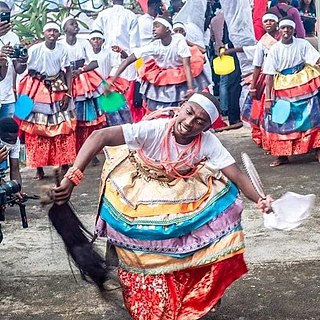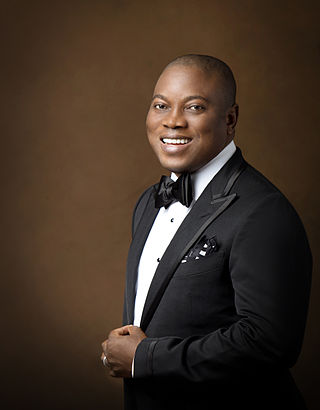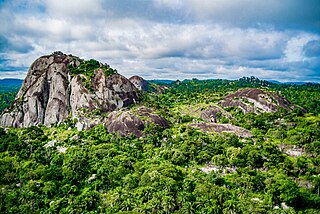Related Research Articles

The Ijaw people, also known as the Ịjọ people, are an ethnic group found in the Niger Delta region in Nigeria, with primary population clusters in Bayelsa, Delta, and Rivers. They also have significant population clusters in Edo, Lagos, Ondo. and small parts of Akwa Ibom.

The Niger Delta is the delta of the Niger River sitting directly on the Gulf of Guinea on the Atlantic Ocean in Nigeria. It is located within nine coastal southern Nigerian states, which include: all six states from the South South geopolitical zone, one state (Ondo) from South West geopolitical zone and two states from South East geopolitical zone.

The Itsekiri are an ethnic group who mainly inhabit Nigeria's Niger Delta area. They speak a Yoruboid language and can be found in Ondo, Edo and Delta State. The Itsekiris presently transcend a population of over 1 million people and live mainly in parts of Ondo, Edo and majorly in the Warri South, Warri North and Warri South West local government districts of Delta State on the Atlantic coast of Nigeria.
Articles related to Nigeria include:
The Eastern Apoi tribe of the Ijaw people is located in central Bayelsa State, Nigeria. The Eastern Apoi tribe is small and geographically isolated. Apoi settlements include: Keme-ebiama, Kolokologbene, Ogboinbiri, Sampou, Gbaran, Kassama, and Azama. Migrants from the Eastern Apoi clan established the Western Apoi clan in Ondo State hundreds of years ago. Also, the Arogbo tribe traces its origins to a migration from the Apoi town of Gbaran.
The Western Apoi tribe live in Ondo State, Nigeria. The Apoi are of ijaw decent and are also called Apoi, Ijo-Apoi or Apoi-Ijo. They consists of nine settlements: Igbobini, Ojuala, Ikpoke, Inikorogha, Oboro, Shabomi, Igbotu, Kiribo and Gbekebo. The Apoi inhabit higher ground than most of the other Ijaw tribes. They speak ijaw and a southeastern dialect of the Yoruba language called Apoi which is not very different from the Ikale dialect. The Apoi might have undergone a linguistic shift centuries ago from an Ijo based dialect to Yoruba due to intermarriages with the Ikale, and isolation from the Niger Delta due to their location inland and away from the main body of Ijo people. They are bordered to the north and east by the Ikale and to the west and partially southwards by the Ilaje. The clan shares the other section of their southern border with the Arogbo.
The Arogbo Izon People "are a Clan or Sub-ethnic group of the larger Izon Nation in Nigeria. Izon Nation is one of the largest Ethnic Groups in the Niger Delta Natural Region. They are very valiant and courageous folks. They are domiciled in the Southeastern part of present-day Ondo State from about the 9th Century A.D. The Arogbo Izon Ibe covers over One Hundred And Twenty (120) Izon Towns and Villages with headquarters at AROGBO TOWN.
The Egbema tribe, also called Egbema Kingdom, is a sub-clan of the Ijaw people. They are of Ijaw ethnicity from the Delta and Edo States.
The Bille Kingdom, located in Rivers State, Nigeria, is an Ijaw clan positioned west of Bonny Island and south of Port Harcourt. Located in Degema local government area of Rivers State, it comprises 30 settlements, including Bille Town, which serves as the kingdom's headquarters and is home to approximately 41,000 residents out of a total population of about 77,000.
The Engenni people live in the Niger Delta region of Nigeria. They are among the many sub Ijaw groups but they speak a language which linguistic scholars have described to be Edoid. They live in close proximity with other Ijaw people. They primarily live in Ahoada west local government area of Rivers state, Nigeria. Although they consider themselves to be Engenni, the Engenni speak an Edoid language. Alagoa (2003) said: “---The penetration of the Niger-Delta by Edoid groups extends to the Epie-Atissa and Engenni of the central and Eastern Niger-Delta----The Epie, along with the Ogbia and other groups of the central and eastern Niger-Delta, are historically united with the Ijaw.” The other groups of the central and eastern Niger-Delta which Professor Ebiegberi Alagoa said that were historically united with the Ijaw, include the Engenni, as shown from his narrative above. The Engenni have close relations with neighbouring Ijaw tribes such as the Zarama and Epie-Atissa.
The Kabo tribe of the Izon people lives in the vicinity of Patani in Delta State, Nigeria. The tribe gets its name from its founder, Kabo, and from Kabobolou Creek. Two Kabo towns are located along the creek. Other Kabo settlements include: Patani, Elemebiri (Ofonibeingha), Asamabiri, and Ekperiwari.
The Nkoro tribe' of the Ijaw people lives in southeastern Rivers State, Nigeria. Nkoro settlements include: Nkoro, Ayama, Dema, The cultural traditions have been influenced by its proximity to the Andoni, the Bonny. The Nkoro dialect is a dialect of the Ijaw language.
Ogbia is a traditional Kingdom and Local Government Area of Bayelsa State in the Niger Delta region of Nigeria. The headquarters of both the Traditional Kingdom and Local Government is located in Ogbia Town at 4°39′00″N6°16′00″E.
The Itsekiri language is a major branch of the Yoruboid group of languages, which as a group, is a key member of the Volta–Niger sub-family of the Niger–Congo family of African languages. Itsekiri is spoken by nearly 1,000,000 people in Nigeria as a first language and by many others as an additional language notably in the Niger Delta and in parts of Edo and Ondo states of Nigeria. The other key members of the Yoruboid group are Yoruba and Igala along with the various Yoruba dialects spoken in Benin and Togo.
The Urhobos are a people located in southern Nigeria, near the northwestern Niger Delta. They are the major ethnic group in Delta State. The people of this ethnic group speak the Urhobo language. Their population is approximately 7 million.
Izon, also known as (Central–Western) Ijo, Ijaw, Izo and Uzo, is the dominant Ijaw language, spoken by a majority of the Ijaw people of Nigeria.
Onogbokor is an Isoko-speaking town in the Ndokwa East Local Government Area (LGA), Delta State, Nigeria. Until the creation of Delta State in 1991, it was formerly with the Ndoshimili LGA with headquarters located in Kwale, in the defunct Bendel state. It shares common boundaries with Iyede-Ame in the south, Igeh to the east, Umuolu and Itebiege to the north and Akara-etiti on the west. The town has three quarters: Ushie, Ogbe-ekpako and Ove. Inhabitants of the town dominantly speak the Isoko dialect with few migrant Ụkwụànì speakers. They intermarry Ụkwụànìs, Ijaws and other tribes. As a clan, it has four communities: Ewo-Okpe community, Okporo community, Ewo-eboy community and Obere community. There are migrants from neighbouring nearby communities and pockets of Ijaw fishermen and Hausa petty traders in the clan.

Kingsley Kuku is a Nigerian political and environmental rights activist, the special adviser to former President Goodluck Jonathan of Nigeria on Niger Delta Affairs and the chairman of the Presidential Amnesty Programme.
The Kaiama Declaration was issued by the Ijaw Youth Council (IYC) of Nigeria on 11 December 1998 to attribute the political crisis in Nigeria to the struggle for the control of oil mineral resources, while asserting that the degradation of the environment of Ijawland by transnational oil companies and the Nigerian State arise mainly because Ijaw people have been robbed of their natural rights to ownership and control of their land and resources. The council was formed in the town of Kaiama after 5,000 Ijaw people representing over 40 Ijaw clans, chose to articulate their aspirations for the Ijaw people, and to demand an end to 40 years of environmental damage and underdevelopment in the region.

The South South is one of the six geopolitical zones of Nigeria. It designates both a geographic and political region of the country's eastern coast. It comprises six states – Akwa Ibom, Bayelsa, Cross River, Delta, Edo, and Rivers.
References
- ↑ Alagoa, Ebiegberi Joe (2005). A History of the Niger Delta, Port Harcourt: Onyoma Research Publications. ISBN 978-37314-5-9